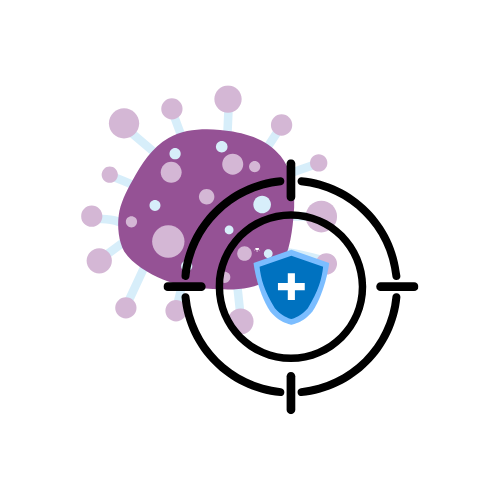Research
Imaging and therapy in immuno-oncology
Nuclear Imaging and Therapy in Immuno-Oncology
Our research focuses on developing novel radiopharmaceuticals to improve the survival and quality of life of cancer patients. Depending on the radionuclide of choice, these radiopharmaceuticals are used to visualize tumors and their microenvironment or to specifically irradiate cancer cells. Our vision is that the combination of radionuclide imaging and therapy offers unique opportunities to improve the treatment of cancer patients.
Targeted radionuclide therapy (TRT) is a systemic treatment that can deliver high radiation doses to cancer lesions while sparing healthy tissues. It is an emerging treatment modality for cancer patients. Despite its initial successes, e.g. in prostate cancer and neuroendocrine tumors, treatment responses only last for a short period of time and many patients do not respond at all. We develop strategies to improve the efficacy of TRT by developing novel radiopharmaceuticals with improved tumor targeting characteristics and by in depth mechanistic research to understand TRTs mechanism-of-action, to develop more effective treatment schedules and combination therapies. This work includes in vitro experiments (2D and 3D), small animal studies, and first-in-human clinical trials. Furthermore, imaging and dosimetry is an integral aspect of our research to better understand dose-biological effect relationships.
Radionuclide imaging is applied in multiple research projects. For example, we develop novel radiopharmaceuticals to improve the detection of cancer lesions, thereby improving diagnosis and guiding treatment decisions. Furthermore, novel therapeutic agents are radiolabeled to assess their in vivo distribution and thereby predict treatment efficacy and safety in (pre)clinical studies. Finally, we apply radionuclide imaging to non-invasively characterize (changes) in the tumor microenvironment, for example during therapeutic interventions.
Research in our group is curiosity driven, but always with clinical impact in mind. Translation is an integral part of our work. Preclinical results often lead to first-in-human studies or provide important information for clinicians to optimally design their clinical trials, while urgent questions from clinical experience are investigated in our preclinical research.

